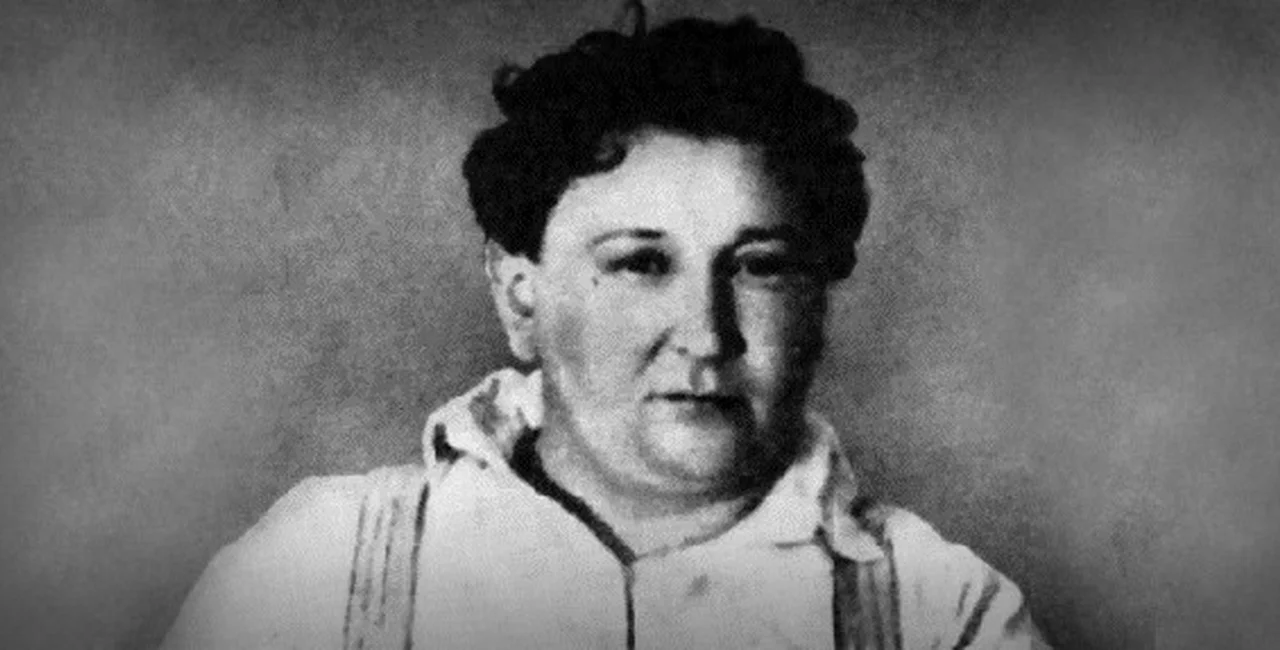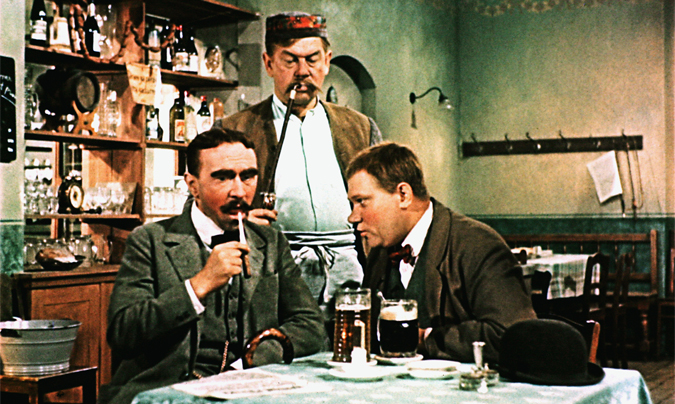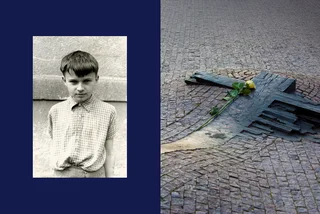Jaroslav Hašek, creator of one the most famous and enduring Czech literary figures, the Good Soldier Švejk, was only 40 when he died of heart failure on January 3, 1923, having succumbed to the effects of heavy, almost legendary, drinking. Renowned as a humorist and as epitomizing a Bohemian-strain of bohemianism, the life of the man was as outrageous as any literary creation.
First Steps on a Journey
Itinerancy is one word which captures the life of Hašek. Due to poverty, his family moved frequently. In his late teens, Hašek went on a couple of walking tours with his younger brother. You can follow these trips and others courtesy of Hašek’s biographer, Radko Pytlík.
From these trips, Hašek brought back story ideas. His first published work – a feuilleton called “Gypsies at the Feast” – came out when he was 18. In the next couple of years his success grew. By 1904, he had about 50 published pieces.
Political Games
Politics was another youthful passion, though reading accounts of Hašek’s life, such as Cecil Parrott’s breezy bio The Bad Bohemian, or Pytlík’s more in depth Toulavé house (The Vagabond Gosling), it’s hard to know how serious he was. He was arrested for his involvement in Prague’s anarchist group and under police surveillance. But he was someone who seemed to enjoy taunting authority for the hell of it.
His antics weren’t appreciated by all, especially the parents of Jarmila Mayerová, the woman Hašek would later marry. Jarmila also urged Hašek to seek a more moderate approach, and in one letter asked him to imagine being in the parliament.
“The Party for Moderate Progress within the Bounds of the Law” was probably not what Jarmila had in mind. This parody of a political party, which Hašek helped establish in 1911, was intended to mock the Social Democrats. But I’m getting a bit ahead of myself.
Source of Inspiration
Drinking is the activity for which (after his writing) Hašek is most famous. Pytlík writes, “If we were to mention all the places Hašek visited, we would write down the majority of drinking establishments of pre-war Prague.” Even so, he himself has made an attempt to cover some of them.
Montmarte, still in OId Town, was one favourite haunt. U Zlatého litru (today called Balbínova Poetická Hospůdka), in Prague 2, was where he worked. Surprisingly, he didn’t drink much while writing, saving the alcohol for his carousing. It was here, down on his luck, he ran into Ladislav Hájek, then-editor of Animal World. Hájek offered him a place to stay and a job. Hašek soon became editor.
The job coincided with a brief period of stability. He married Jarmila in 1910. He worked from home – sending Jarmila to fetch him beer. The two of them even tried to start a dog kennel. But the domestic bliss was short lived. Hašek soon sought the revelry of the pubs again.
The editorial position at Animal World was equally short lived. His output was phenomenal, but he was inventing facts about animals; for example, tigers don’t like the sound of gramophones but elephants do, or including advertisements for ‘thoroughbred werewolves’.
Around this time, he was contributing to Caricatures. Through this publication he met Josef Lada, who provided the illustrations for Švejk. Caricatures became a more regular employer when his hoaxes cost him his job at Animal World. He never lost his taste for pranks, and later wrote articles for other papers under pseudonyms in which he would debate himself.
Hašek’s most famous hoax was formulated in the bar U Zlatého litru. Here, he and drinking buddy Eduard Drobílek came up with the aforementioned Party for Moderate Progress within the Bounds of the Law. According to Hašek’s contemporary, the writer František Langer, the party was an elaborate scheme by Drobílek to attract business to another pub located at Korunní 25, in the building Kravín, thereby impressing its owner, so Drobílek could date his daughter. Hašek went along it would seem because he enjoyed a joke and the pub had good beer.
The experience inspired his first longer work, The Political and Social History of The Party for Moderate Progress within the Bounds of the Law. Over about 200 pages, it didn’t appear in print until 1924 because the original publisher feared a libel suit over the portraits of public figures.
Švejk Goes to War
In an oft-told story, Hašek woke up one morning frantically searching for a piece of paper on which he apparently had a brilliant idea. Jarmila had thrown it out, so Hašek rummaged in the trash until he found it. On it was written a “The Idiot in the Company”. This was May 1911. The first Švejk stories appear in 1912.
But it was the publication of the first part of The Good Soldier Švejk and His Fortunes in the World War, after the war in 1921, which transformed Hašek from a colorful rabble-rouser to an enduring literary figure. The experience provided a plethora of targets to ridicule, and the regimented military life also provided a perfect backdrop for Hašek’s “idiot”. Moreover, it was in the army he met František Strašlipka, who is widely believed to be the basis of the later Švejk.
Perhaps the war left this vagabond with a sense of urgency. He was lucky to survive a typhus infection, and capture by the Soviets. A realization of life’s frailty could have spurred him to set out the outline for the first part of the book at the pub U Panků ve Veleslavínové in February 1921. Or maybe it was just a product of his erratic mind. Whatever the explanation, Hašek passed away two years later, completing only four of the projected six volumes about his famous soldier.
Psychiatric Enigma
In 1911, Hašek wrote a short story called “Psychiatric Enigma”, in which a Mr. Hurych stops to lean over the parapet on Charles Bridge, believing he’s heard a cry of distress. A headresser believing he is about to commit suicide “rescues” him, and Hurych is arrested and forced to undergo treatment.
The story is allegedly based on a real event. A hairdresser called Bauer saved Hašek on the bridge, though Hašek denied he was trying to commit suicide. It didn’t save him from therapy. Whether the attempt was genuine or another hoax points to some mental instability. Pytlík believes he was a manic-depressive. There has to be some explanation for his drinking. Not to mention his treatment of Jarmila, who finally left him not long after this incident.
His Legacy
For all the wantonness of his life, it is Švejk for which Hašek is most remembered. One frequently repeated interpretation about Švejk is that through him Hašek captured the essence of the Czech national character. The picaresque novel is a genre well suited to satire because it enables the author, with a minimum of effort, to introduce a wide variety of social types in different and often incongruously funny situations in order to expose their hypocrisy, vanity, and stupidity. Švejk’s (pretended) stupidity consistently injects a grim and unrelenting irony, particularly against the hypocrisy of the church, the stupidity of the army and the police, and the destructiveness of war.
The writer and former dissident Ludvík Vaculík takes a dim view of this generalization. In his own feuilleton from 1984, Vaculík sees Švejk as a type of ‘institutionalized incompetence’, seeing the characters expression in the face of his then communist interrogator. I have to agree that reducing a nation to one character is inaccurate. It’s this Švejk’s more general fight against bureaucracy and war through his questionable stupidity which accounts for his lasting appeal and why he crosses national borders.
Related articles












 Reading time: 6 minutes
Reading time: 6 minutes 

























